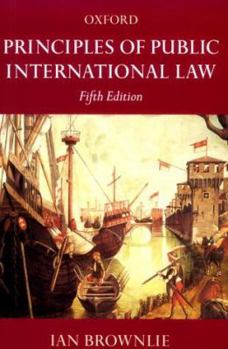Principles of Public International Law
Select Format
Select Condition 
Book Overview
This is the fifth edition of the leading textbook on Public International Law. The material has been thoroughly revised and updated to take account of developments since 1990, and a new chapter on international environmental protection has been added. The book retains all its original strengths - clear exposition, rigorous analysis, detailed referencing and comprehensive coverage.
Format:Paperback
Language:English
ISBN:0198762992
ISBN13:9780198762997
Release Date:January 1999
Publisher:Oxford University Press, USA
Length:792 Pages
Weight:2.30 lbs.
Dimensions:1.4" x 9.1" x 6.1"
Customer Reviews
5 ratings
Possibly the best text on international law
Published by Thriftbooks.com User , 14 years ago
This book, by the late Sir Ian Brownlie, Chichele Professor of Public International Law at Oxford University 1980-99, is possibly the best text on international law. His chapters on war and peace are of special merit. He observes, "The member States of the United Nations, or at least the majority, recognised the legality of wars of liberation in certain conditions." Brownlie comments on NATO's 1999 attack on Yugoslavia: "There is a preliminary and major difficulty in classifying the action. This because the authenticity of the subsequent claims that the action had humanitarian motives is substantially undermined by the fact that, beginning in October 1998, the threats of force were linked directly to a collateral political agenda, that is, the acceptance by Yugoslavia of various political `demands' concerning the status of Kosovo, these `demands' being presented under threat of a massive bombing campaign. This background has been ignored by many commentators." He points out, "The position in 1999, when the operations took place, was that there was little or no authority and little or no state practice to support the right of individual States to use force on humanitarian grounds in international law. ... State practice has been overwhelmingly hostile to the concept of intervention on such a selective and subjective basis. The weak legal position was recognised by the United Kingdom Government when it informed the Select Committee on Foreign Affairs of the House of Commons of its aim of establishing in the United Nations `new principles governing humanitarian intervention'." Brownlie notes, "It is difficult to bring forcible regime change within concept of self-defence or the principle of self-determination. ... the international consensus [is] that individual States, or a group of States, cannot resort to force (for purposes other than self-defence) except with the express authorization of the Security Council." The Foreign Ministers of the Group of 77 (actually 132 states) declared on 24 September 1999 that "They rejected the so-called right of humanitarian intervention, which has no basis in the United Nations Charter or international law." Brownlie observes, "Since 1945 the practice of States generally has been opposed to anticipatory self-defence. The Israeli attack on an Iraqi nuclear reactor in 1981 was strongly condemned as a `clear violation of the Charter of the United Nations' in Security Council Resolution 487 (1981) (adopted unanimously)." He points out drily, "The Bush doctrine, published in 2002, claims a right of `pre-emptive action' against States who are seen as potential adversaries. This doctrine is applicable in the absence of any proof of an attack or even an imminent attack. This doctrine lacks a legal basis, but it does have an historical parallel, the attack on Serbia by Austria-Hungary in 1914." Brownlie also criticises `the gross and persistent measures of discrimination and breaches of humanitarian law on the
A good book.... but not a international law bible
Published by Thriftbooks.com User , 19 years ago
Ian brownlies'principles is a good survey of international law, but don't expect a full overview of international law. It lacks some deep exploration some parts, but well it is a principle book. At last: its a survey about some of the main instituts of international law, in a direct, objective style of writting. PS: For non common law student's, this is a basic, very basic course with some good points.
but Brownlie says...
Published by Thriftbooks.com User , 24 years ago
As mentioned by other reviewers, to even consider undertaking Jessup moot court competition, or any other major project in international law without first turning to Brownlie is to miss one of the most comprehensive texts on public international law. There are those of us who have comprehensively silenced arguments on a point of law with the phrase ' but Brownlie says...'. No international law collection is complete without this text.
Dr. Richard M.J. Thurston
Published by Thriftbooks.com User , 25 years ago
Brownlie remains a standard in the study of international law. Not only is it an excellent text in itself, but the copious citations make it a very valuable research tool. Having had a long association with the Jessup International Law Moot Court competition, I highly recommend this text to all students preparing for the Jessup. Its inclusion as part of the research process should be considered a must.
The Bible on International Law
Published by Thriftbooks.com User , 25 years ago
This book is a must for any serious research on public international law. Specially for the Philip C. Jessup International law moot court competition. Take my advice.






